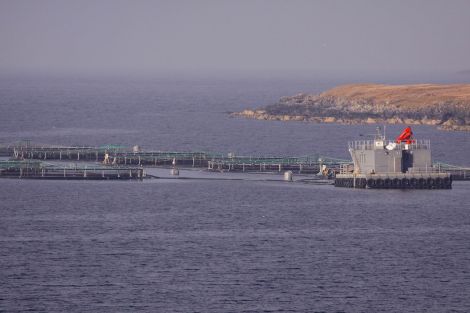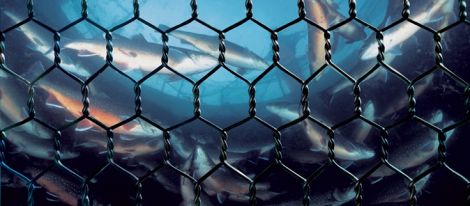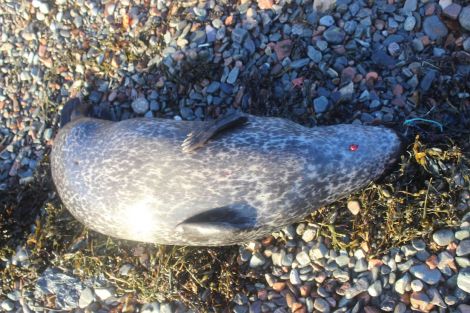News / Drive to end seal shooting in Shetland
SHETLAND’S biggest salmon company is taking the lead in putting an end to seal attacks on their cages by investing more than £2 million in tough new anti-predator nets.
The investment comes as a local wildlife sanctuary calls for a complete ban on the shooting of common seals in the isles after finding a healthy young adult female shot on a beach outside their property.
Hjaltland Seafarms, which operates in the area, insisted they did not shoot the common seal that washed up on the East Ayre, outside Hillswick Wildlife Sanctuary, on 5 January.
The company said it had not shot any common seals this year, and since the Hillswick death it has instructed all its area managers to avoid shooting common seals “if at all possible”.
Hjaltland farm operations manager Grant Cumming said the company has had a licence to shoot only one common seal over the last 12 months, but the company does not want to add to the more than 50 per cent decline in the common seal population over the past decade.
He said their problem is with grey seals, who are more robust than the commons and are able to breach standard anti-predator nets, costing the Shetland salmon industry hundreds of thousands of pounds in lost fish.
Now Hjaltland Seafarms is installing new extra-strong ‘Econets’ on 26 of their cages at three sites in the Wadbister area, where they have the biggest problem with seal attacks.
The tough plastic fencing-style nets create a rigid barrier around the salmon cages that the seals should not be able to penetrate. But at £40,000 each, this year’s investment alone comes to more than £1 million.
Hjaltland has set aside a further £1 million to be spent on anti-seal nets next year, but with around 200 cages to protect it is also investigating the slightly cheaper option of HDPE (high density polyethylene) netting – not as strong as Econets but still tougher than the usual nylon that is used.
Become a member of Shetland News
Cumming said they had tried many different techniques, including acoustic deterrents, to deter grey seals, who often worked in packs to target salmon and could kill hundreds at a time just to suck out their livers.
The company is licensed to shoot seals by Marine Scotland, but he acknowledged this was not a long term answer to the problem.
“Shooting seals does not offer a fool proof solution and it’s not something we are very comfortable with,” he said.
“We have to look for a much better means of controlling the predation of seals on our fish.”
After successful trials using Econets at a site in Scalloway, Hjaltland is now in the process of installing them around Wadbister.
None of the Econet protected cages has suffered a single seal attack so far, Cumming said.
“But there is a proviso. Seals are very intelligent and always attack the easiest pens, so we won’t know if we have been successful really until all the salmon cages are protected.
“If at that stage we get no seal attacks we will know it’s an effective measure.”
Jan Bevington of Hillswick Wildlife Sanctuary said she was surprised and very pleased to hear that Hjaltland Seafarms had issued an instruction not to shoot common seals.
She added that it was “a big step forwards” for the company to say there was no future in shooting seals, and hopes other farms follow their example and invest in tougher anti-predator nets.
But after finding a healthy common seal shot outside her sanctuary, she is now calling for the Scottish government to implement a complete ban on killing common seals in Shetland and elsewhere.
“The figures are quite horrifying. Common seals are down more than 50 per cent in Shetland since 2002, but it’s worse in Orkney where it’s 68 per cent and in the Firth of Tay it’s 98 per cent,” she said.
“With figures like these I cannot understand how Marine Scotland gives out any licences to shoot common seals.
“Numbers were improving until the late 1990s when the UK government lifted its ban on shooting in the pupping season, so at the very least that should be reintroduced.
“We have spoken to Hjaltland Seafarms and they assure us they did not kill the seal that was washed up on our beach, but that leaves the question who did.
“Having said that, it is good to hear that Hjaltland are setting an example by spending so much money on trying to avoid having to shoot any seals, because that kind of respect for the environment is the only way forward in the long term.”
Become a member of Shetland News
Shetland News is asking its many readers to consider paying for membership to get additional features and services: -
- Remove non-local ads;
- Bookmark posts to read later;
- Exclusive curated weekly newsletter;
- Hide membership messages;
- Comments open for discussion.
If you appreciate what we do and feel strongly about impartial local journalism, then please become a member of Shetland News by either making a single payment, or setting up a monthly, quarterly or yearly subscription.































































